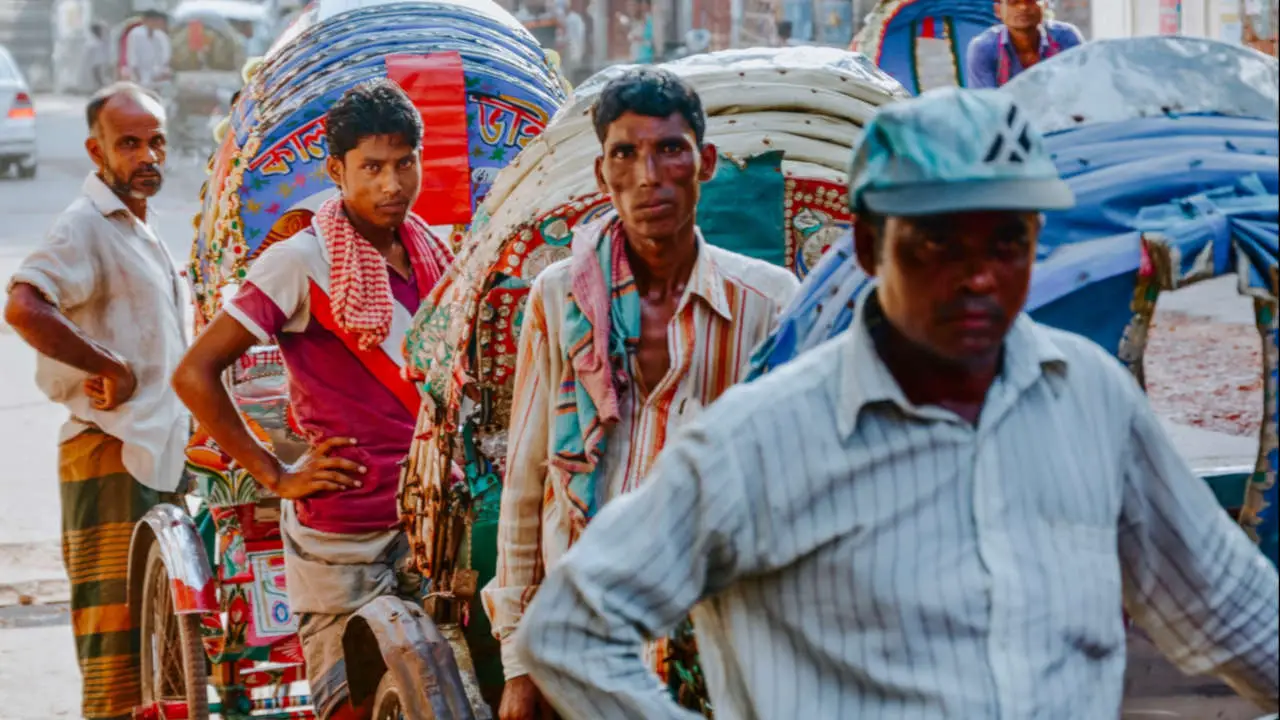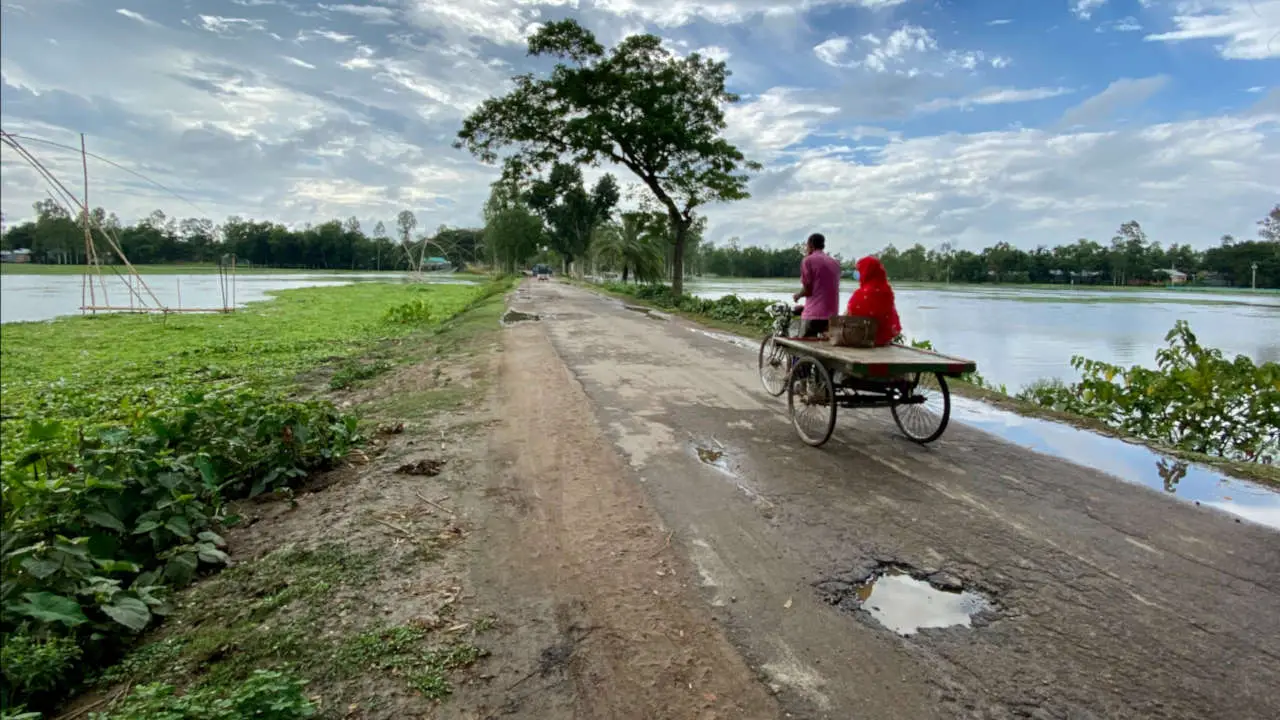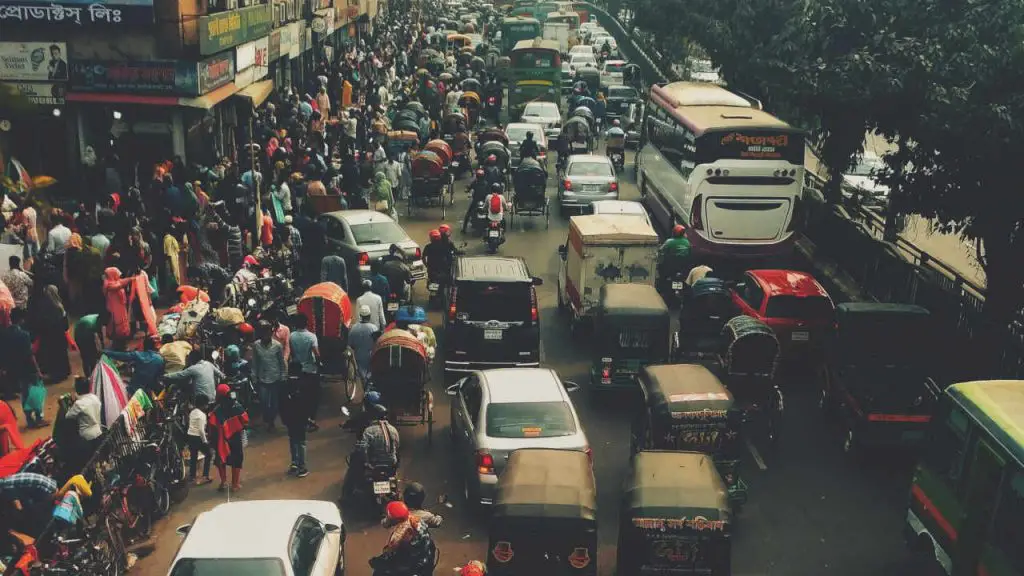After landing in Dhaka, we picked our luggage. The first thing we noticed our DSLR camera was missing. Someone broke our luggage and stole it. We realized our Dhaka trip is going to be wild.
Our Bangladeshi guide advised us not to go outside of our hotel at night. It’s understandable. Even in the Bronx, NYC, we won’t go to specific neighborhoods at night. But the critical difference between NYC and Dhaka is what happens after an unfortunate event.
We stayed in Bangladesh for 48 days. In Dhaka, we spent the majority of that time. After only 15 days, we realized Dhaka is not a livable city.
So, why is Dhaka not a livable city? Dhaka is not livable because of terrible air quality, awful traffic, potholes ridden roads, crimes, lack of city services such as safe drinking water, poor waste management system, dreadful transportation, corruption, people’s disregard for the law, and high living expenses.
Let’s elaborate.
Dhaka is not clean:
Dhaka is dirty. Waste disposal authority piles up household garbage on the side of the roads. Wherever you go, you will see it. People litter everywhere. We’ve seen people throw their household garbage into the sewer lines.
Traffic in Dhaka is horrible:
If you think that traffic in NYC, Los Angeles, and California is horrible, you have not seen Dhaka’s traffic.
We stayed at the “Pan Pacific Sonargaon” hotel. It’s 9 miles away from the Airport. The first day, this 9 mile took us more than 2 hours.
Traffic is worse in the morning and the evening. Traffic is so dreadful that sometimes drivers turn off the engine of their vehicle and wait. It’s because they know they are not going anywhere soon.
If you look at the maps of Dhaka, you would realize this city has zero planning. Dhaka has a limited number of roads and is not wide enough to accommodate 20 million people.
One day we were visiting one of our garment suppliers in Jamgora, Ashulia. From Karwan Bazar, it took us more than 3 hours for this 19 miles journey. It was a horrible experience.
Awful Air quality:
Dhaka’s air is almost unbreathable. If you live in NYC, Chicago, Boston, you have not seen pollution. It feels like a wildfire going on somewhere.
I don’t have a breathing problem. But one of our team members has it. In Dhaka, he told us that he was having a hard time breathing.
Our guide told us he needs to mop his house every day; it’s because Dhaka’s air is appallingly dusty.
Dhaka residents primarily rely on public transportation, such as buses. We have never seen those types of busses anywhere in the world. Those are at least 20 to 30 years old and spew awful black smoke.
Traffic activity in Dhaka shows us that the Bangladeshi government has zero environmental concerns.
Corruption:
We have never seen such blatant corrupted government officials anywhere except Dhaka. Nothing moves in this city without bribery. It’s our experience.
Moreover, Our guide gave us some unique perspective on police corruption.
He recently got his passport. In Bangladesh, the authority does a verification before approving a passport. Generally, the police do this verification. Until you bribe the police during this verification process, they will not verify your application.

Resident’s disregard for traffic rules:
We always say one’s driving behavior reveals one’s character.
In Dhaka, there are traffic lights, but no one follows them. Without a traffic enforcement agent, drivers violate traffic rules all the time. They don’t even follow lane markings.
Traffic won’t stop at a red light unless a police officer is standing in the middle of the road.
During rush hour, we’ve seen traffic going the wrong way. We asked our guide about this, and he said those people are government officials, and the police won’t ticket them or stop them.
When government officials think they are above the law, it’s disturbing. It demonstrates how dysfunctional and selfish Dhaka is.
Lack of city services:
We’ve visited several districts in Bangladesh besides Dhaka. We found that cold weather is not as harsh as in the US. So, house heating with gas is not a thing. People in Bangladesh use natural gas only to cook.
Still, Residents in Dhaka don’t have an uninterrupted gas supply. According to our guide, most of the time, gas pressure is so low to do anything.
During our stay, there was heavy rain. After this rain, we realized that Dhaka’s sewer system is terrible too. The water stagnated on the road for days. Our guide told us people throw their garbage into the sewer line, which blocks the sewer. Therefore, after a light shower, water on the road is a common occurrence. It gets worse when feces leaks into the streets. It’s seriously a messed up situation.
We don’t know how much money Dhaka spends to maintain its roads. Whatever it is, is not enough. Even the unpaved US forest roads are better than Dhaka’s streets. Besides, Dhaka roads are unsafe for pedestrians.
Water is not drinkable:
In the US, we can drink tap water. It’s safe. However, Dhaka’s tap water is undrinkable. It boggles our mind how a city can operate without providing safe drinking water to its residents. If you are visiting Dhaka, please always drink bottled water.
When the water in Flint, Michigan, got contaminated, county, state, and federal authorities came forward to provide safe drinking water to all Flint residents.
Our guide told us contaminated tap water in Dhaka is a decade long issue. There is no visible effort to remedy this. Moreover, tap water is not available 24 hours a day. Dhaka water supply authority provides water only a few times a day. Therefore, poor people living in the slums do not have access to water 24 hours a day.
Dhaka is Expensive:
Believe it or not, Dhaka is as expensive as New York City.
It was our impression that products and services in Dhaka would be cheaper compared to the US. However, we were disappointed. Here are a few examples.
We can buy a 50 inch 4K Samsung TV for $350 from BestBuy in the US. However, the prices of these TVs are twice in Dhaka. Furthermore, smartphones, laptops, and other electronics are costlier in Dhaka than in the US.
A nicer apartment in a good neighborhood, such as the Gulshan area, costs around 70,000 to 80,000 Bangladeshi taka. In USD, it’s about $1,000. Even in the US, except for a few cities, apartment rent does not cost that much.
Good quality clothing is also more expensive compared to the US.
Fast food is costlier too. For example, a single piece of chicken fry costs 80 Bangladeshi Taka or 1 USD. There are numerous examples.
As we can see, Dhaka is as expensive as New York City; however, you get the world’s worst city services there.

Dhaka is densely populated:
Dhaka is one of the most densely populated cities in the world. We’ve never seen so many people in one place except Times Square during the new year’s ball drop.
Lack of public sanitation:
Finding a clean bathroom in Dhaka is impossible. Public urination is common. The unbearable smell makes walking on the sidewalk hard.
Dhaka is unsafe:
Dhaka is not safe at all. Vicious political violence is common. Pickpocketing, theft, murder, mugging, robbery is an everyday occurrence. The corrupt police make it worse. After our Airport theft, we reported it to the Airport police. But they could not recover it in the 48 days we stayed in Bangladesh.
Housing Problem:
Bangladesh is Dhaka centric. Everything happens in Dhaka. All the good-paying jobs are here. Therefore, almost 15% of the Bangladeshi population lives in this tiny city. As a result, the housing crisis in Dhaka is severe.
Moreover, apartments and houses are as expensive as in new york city. Even a taxi driver in new york city can buy a home if he works long enough. On the contrary, in Dhaka, even government officials can’t afford a house.
Fake products:
Fake products are everywhere, especially counterfeit Chinese goods are rampant.
Nightmarish transportation system:
Commuting in Dhaka is a huge pain. Though Uber is available, we have never seen so unprofessional Uber drivers anywhere except in Dhaka.
A bus ride is challenging. Fewer roads, small buses, and too many people make the bus ride painful.
In front of our hotel at Karwan Bazar, we saw thousands of people waiting hours after hours for a bus each evening.
Conclusion:
In this article, we summarized our Dhaka visit experience. It’s incredible how this dysfunctional city keeps going.
During our visit, we met several politicians. But they are so proud of their city that they can’t stand any criticism of this city. However, if you don’t diagnose the disease first, how can you treat the illness? Because of all the problems that we saw in Dhaka, we consider it an unlivable city.
